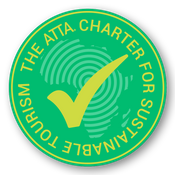Toolkit
Incorporating sustainability into your operations isn't just about preserving the planet; it's about safeguarding the unique cultures, environments, and communities that make African tourism so extraordinary. With the ATTA Sustainability Toolkit, you'll discover practical tools, expert guidance, and inspiring success stories from industry leaders who have transformed their businesses while leaving a positive impact on the continent.
Join us as we venture on a transformative adventure, one that balances the thrill of exploration with the responsibility of preservation. Together, we'll explore best practices, discover innovative solutions, and collaborate on building a sustainable future that benefits travelers, communities, and the planet.
Let's collectively embrace this exciting journey, where sustainable, meaningful travel isn't just a destination—it's the path we choose to tread, hand in hand with the world's most stunning landscapes and vibrant cultures.
Welcome to the ATTA Sustainability Toolkit, where your adventure begins with a commitment to making a difference.
At ATTA®, we are committed to promoting and supporting sustainable practices within the African travel and tourism industry. We recognize the importance of protecting the environment, preserving cultural heritage, and fostering socio-economic development in the regions our members operate. Our sustainability policy serves as a guiding framework for our association, our members, and our stakeholders and have created an ATTA Charter for Sustainable Tourism based on the following principals:

Charter Principals
Environmental Stewardship:
- We encourage our members to minimize their environmental impact by promoting responsible resource management, waste reduction, and pollution prevention.
- We encourage our members to implement sustainable practices such as energy efficiency, water conservation, and waste management.
- We support initiatives that contribute to biodiversity conservation, protection of natural habitats, and responsible wildlife tourism.
Socio-cultural Preservation:
- We value and respect the diverse cultures and traditions of the communities we engage with.
- We promote fair and equitable practices, respecting the rights and dignity of local communities and indigenous peoples.
- We encourage our members to engage in community-based tourism, supporting local businesses and preserving cultural heritage.
Economic Prosperity:
- We strive to create economic opportunities that benefit local communities, promoting inclusive and sustainable growth.
- We advocate for fair and ethical business practices, promoting transparency, and supporting responsible supply chains.
- We encourage our members to contribute to the socio-economic development of the regions they operate in, empowering local entrepreneurs and fostering job creation.
Climate Action:
- We acknowledge the importance of addressing climate change and commit to reducing our carbon footprint.
- We promote sustainable transportation options, encourage carbon offsetting, and support renewable energy initiatives.
- We advocate for climate resilience and adaptation measures within the tourism industry.
Collaboration and Partnerships:
- We believe in the power of collaboration and strive to foster partnerships with industry stakeholders, government bodies, NGOs, and local communities.
- We actively seek opportunities to share knowledge, best practices, and resources to advance sustainable tourism in Africa.
- We support and engage in initiatives that promote sustainability, conservation, and responsible tourism at regional and international levels.
Education and Awareness:
- We are committed to raising awareness about sustainable tourism practices among our members, industry professionals, and travelers.
- We provide educational resources, training programs, and platforms for knowledge sharing.
- We encourage our members to educate and inspire travelers to make responsible choices that support sustainability and local communities.
Monitoring and Reporting:
- We strive for continuous improvement in our member’s sustainability efforts.
- We support programs and initiatives that monitor and evaluate progress, set measurable targets, and report transparently on sustainability performance.
- We encourage our members to monitor and report on their sustainability initiatives, sharing their successes and lessons learned.
This sustainability policy is a living document that will be reviewed periodically to ensure its relevance and effectiveness. We commit to upholding these principles, promoting sustainable practices, and driving positive change within the African travel and tourism industry.
On this page you will find information relating to:

